EPICS in IEEE is proud to announce the launch of The Fischer Mertel Community of Projects. This grant supports students in solving challenges that will benefit their community in a tangible way through EPICS in IEEE. This grant honors two IEEE Electromagnetic Compatibility Society (EMC) Hall of Fame engineering leaders and their dedication and contributions to the field of engineering: Joe Fischer and Herb Mertel.
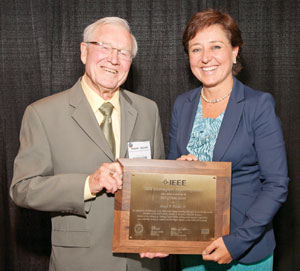 Joe Fischer began his professional career as an antenna designer after working as a beach lifeguard in San Diego while he pursued his education at San Diego State University, earning a BS and MS in Physics. Joe began developing current probes to solve EMC problems on the Atlas Missile program while working at General Dynamics with Herb Mertel. Joe and Virginia founded Fischer Custom Communications, Inc. in 1971. The IEEE awarded Joe the Hall of Fame award in 2011. He was EMC-S president in 1972, distinguished lecturer from 1989 – 1991, on the EMC-S board for six years, and technical program chair of the IEEE EMC Symposium in 1979 and 1986.
Joe Fischer began his professional career as an antenna designer after working as a beach lifeguard in San Diego while he pursued his education at San Diego State University, earning a BS and MS in Physics. Joe began developing current probes to solve EMC problems on the Atlas Missile program while working at General Dynamics with Herb Mertel. Joe and Virginia founded Fischer Custom Communications, Inc. in 1971. The IEEE awarded Joe the Hall of Fame award in 2011. He was EMC-S president in 1972, distinguished lecturer from 1989 – 1991, on the EMC-S board for six years, and technical program chair of the IEEE EMC Symposium in 1979 and 1986.
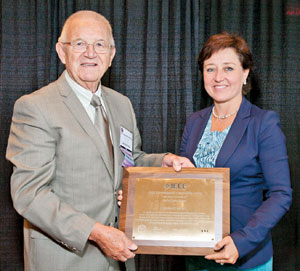 Herb Mertel was an immigrant and held his first electrician job at age 13 in Frankfurt, Germany. Living the American dream, he served in the US Army, graduated from Indiana Technical College in electrical engineering, and worked at General Dynamics and United Controls until he founded his own company EMACO which he sold in 1988 to TUV. He chaired the EMC Society’s annual symposium in San Diego, California in 1986. He was a member of the Society’s Board of Directors for 10 years during the 70s and 80s. In 2005, Herb received the Laurence G. Cumming Award for outstanding service to the EMC Society. The EMC Society presented the prestigious “Hall of Fame” Award to Herb in 2009 for his continued contributions to the IEEE EMC Society throughout his long and illustrious career.
Herb Mertel was an immigrant and held his first electrician job at age 13 in Frankfurt, Germany. Living the American dream, he served in the US Army, graduated from Indiana Technical College in electrical engineering, and worked at General Dynamics and United Controls until he founded his own company EMACO which he sold in 1988 to TUV. He chaired the EMC Society’s annual symposium in San Diego, California in 1986. He was a member of the Society’s Board of Directors for 10 years during the 70s and 80s. In 2005, Herb received the Laurence G. Cumming Award for outstanding service to the EMC Society. The EMC Society presented the prestigious “Hall of Fame” Award to Herb in 2009 for his continued contributions to the IEEE EMC Society throughout his long and illustrious career.
Over the next 5 years, the Fischer Mertel Community of projects will 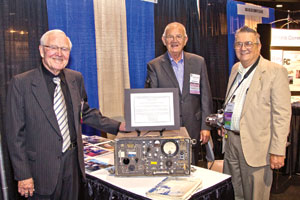 support global projects within the areas of Environment, Access and Abilities, Human Services, and Education/Outreach. In 2023, the following 3 projects have been selected to be part of this community. The Fischer and Mertel families are proud to support these projects in remembrance of Herb and Joe. “I’m glad to collaborate with the family of Joe Fischer to honor these two engineer leaders. By helping fund student groups to design and deliver engineering solutions to community and environmental problems I hope to create a positive impact all around the globe,” says Tina Mertel (daughter of Herbert Mertel).
support global projects within the areas of Environment, Access and Abilities, Human Services, and Education/Outreach. In 2023, the following 3 projects have been selected to be part of this community. The Fischer and Mertel families are proud to support these projects in remembrance of Herb and Joe. “I’m glad to collaborate with the family of Joe Fischer to honor these two engineer leaders. By helping fund student groups to design and deliver engineering solutions to community and environmental problems I hope to create a positive impact all around the globe,” says Tina Mertel (daughter of Herbert Mertel).
Increasing Inclusion of Visually Impaired People with a Mobile Application for English Learning- (IEEE Colombian Caribbean Section)- Access and Abilities
In just Colombia alone, there are 1.9 million individuals who are visually impaired,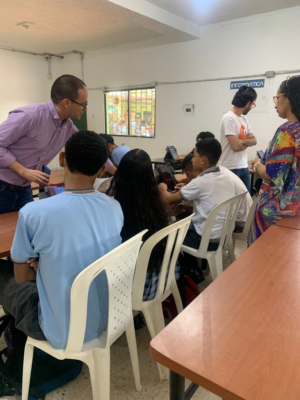 and the majority are uneducated due to limited financial means and access to inclusive educational programs. It is important to ensure that the visually disabled get the same education as the rest of society, and this can be accomplished through technology.
and the majority are uneducated due to limited financial means and access to inclusive educational programs. It is important to ensure that the visually disabled get the same education as the rest of society, and this can be accomplished through technology.
A team of members from the IEEE Colombian Caribbean Section is working to raise awareness toward the inclusion of people with visual impairments in English learning. They are working to accomplish this through the creation of a mobile application that addresses the full spectrum of visual impairments and allows each student to learn without restriction.
The basis of their solution is based on Vygotsky’s approach to the visually impaired, through inclusion and focusing on addressing the student’s strengths rather than weaknesses. Their English learning mobile application is to be accessible to everyone and does not just address one type of visual impairment but rather a combination of all needs.
EPICS in IEEE has granted the team $5,000.00 to start designing their mobile application, which will be a major advancement in English learning for the visually impaired. The project is underway and the next step is to visit local schools to test the products including a previous version of the mobile application and a “how to learn programming” curriculum.
ISort – Sort and Shredding Machine to change Gen Z-IEEE Student Branch University of Peradeniya (Sri Lanka)-Environment
There are over 400 MT of plastic waste generated across Sri Lanka every day, according to the Ministry of Environment. The existing method of reducing, recycling, and reusing, is not helping as much as it should, which is why alternative methods to reduce the amount of plastic waste are needed.
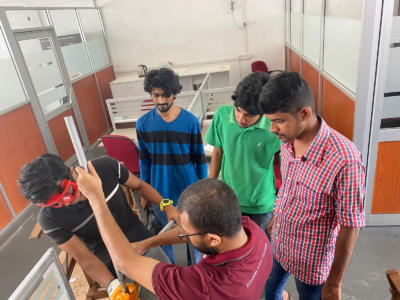 This student team from the University of Peradeniya will be addressing this issue by creating a device called iSort to encourage recycling practices, especially amongst Generation Z. iSort is A Plastic Sorting and Shredding Machine which has several components: it has a sorting mechanism for items with 90% accuracy in identifying the item, a unique crushing and shredding mechanism, and a reward system via a phone application for consumers to recycle their items.
This student team from the University of Peradeniya will be addressing this issue by creating a device called iSort to encourage recycling practices, especially amongst Generation Z. iSort is A Plastic Sorting and Shredding Machine which has several components: it has a sorting mechanism for items with 90% accuracy in identifying the item, a unique crushing and shredding mechanism, and a reward system via a phone application for consumers to recycle their items.
The team already researched today’s recycling practices and pinpointed areas that need improvement, The iSort device will focus on the areas that need improvement such as the time-consuming issue of sorting through the plastic. Their device will use automatic classification, using a deep neural network model with a convolution neural network, to help identify which pieces of trash are plastic, and which are not.
EPICS in IEEE granted this team $1,059 to complete their project and make a difference in this community.
Generating Environmentally Friendly Power while Reducing Ill-Health- (IEEE Uganda Section)- Environment
This project involves engineering students and IEEE Volunteers coming together to utilize their engineering to design and fabricate a bicycle pedal power generator which in turn shall be piloted in one community. The purpose of the generator is to reduce ill health and environmental degradation as well as supply reliable and affordable power. Further, this project enables engineering students to apply their engineering skills within their communities.
In Uganda, this project can be replicated and used in the villages as a useful electricity source for a small family where the family members themselves can charge the battery by pedaling for a short period of time. This will not only provide electricity when needed but also provide a useful way of physical exercise for them. And due to the low initial cost and very low maintenance cost, the wide-scale application of the ‘Paddle Powered Generator’ can be a suitable source of renewable energy.
EPICS in IEEE granted this team $4,700 to complete this project and deploy a prototype in the community.
Support for the Fischer Mertel Community of Projects was donated through the IEEE Foundation. EPICS in IEEE would like to thank the Fischer and Mertel families for their donation to support these projects and those in future years.
EPICS in IEEE is a donor supported program. Donations to the program support student teams like the above-mentioned to make a real impact in their communities, resulting in young engineers well-equipped for the workforce. If you would like to make an impact like the Fischer and Mertel families supporting EPICS in IEEE, we invite you to donate today.
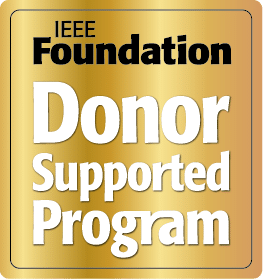

Recent Comments